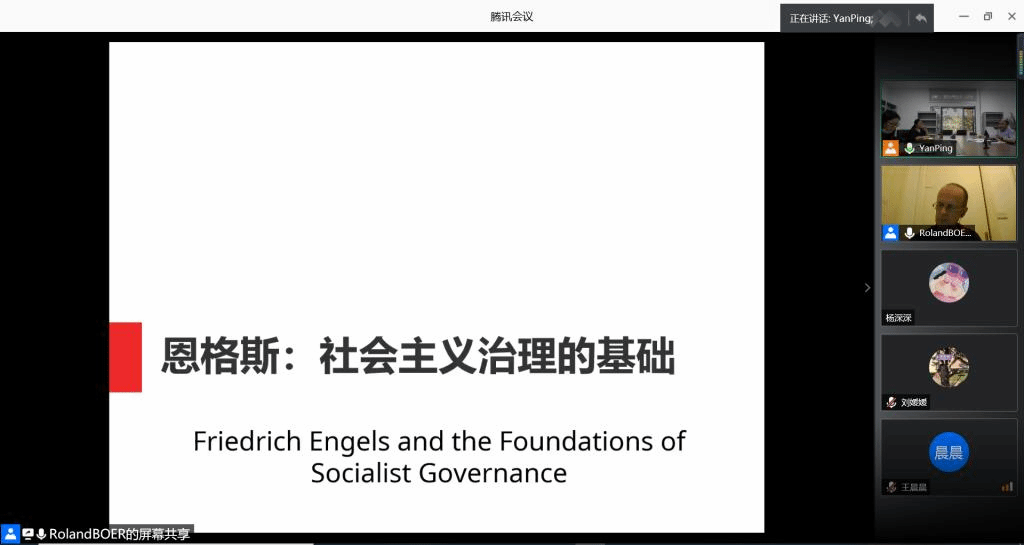At 18:30 p.m. on June 19th, our college held the fifth lecture on “the world's leading scholars' short lecture project and the commemoration of 200th anniversary of Engels’ birth” on Tencent Meeting. This lecture has the honor to invite Roland Boer, one of the most creative Marxist researchers, a research professor of the school of Humanities and social sciences of Newcastle University, Australia, an adjunct professor of Dalian University of Technology of China and a Ph.D. of McGill University Canada Professor. The topic of this lecture is “Friedrich Engles and the Foundations of Socialist Governance”.This lecture is presided over by President Hong Xiaonan, translated by Mrs Yanping, and attended by all teachers and students.

Professer Boer first introduced the writing background of his new work Friedrich Engles and the Foundations of Socialist Governance. He was attacted by Engels’ views on capitalist state and socialist governance in the process of studying the issues related to social governance. Then Boer started with keywords, which are “Public Gewalt ”, “Political Character”, “Administration of Things and Managing Production”, “Standing in the Midst of Society”, “Standing in the Midst of Society” and “Aufhebung of Baseline Communism” , to profound explain his understand of Engels’ Socialist Governance. It include four aspects: Separated Public Power, Socialist Gewalt and the Dictatorship of the Proletariat, Abolition or Dying Away,Towards Enmeshed Governance. First, in socialist governance and especially communist governance, public power is no longer to be separated from society, but now stands in the midst of society. Second, while public power continues, political character does not. Political character means antagonistic politics based on class conflict. Thus, when public power loses its political character, we find the beginnings of non-political elections, as well as consultative multi-party democracy. Third, governance becomes the administration of the stuff of life and managing economic production and distribution for the good of the community as a whole. That is, it becomes possible to focus on the common good, to serve the community (as is the Chinese focus). Fourth, for Engels baseline communism requires dialectical transformation (Aufhebung) that does not simply abolish all that has gone before and begins anew, but preserves and qualitatively transforms this baseline communism into full communism. Finally, as a consequence of Engels’s argument concerning the Aufhebung of baseline communism, we begin to see that the distinction between state and society begins to die away.


In the interactive question section, launched a heated discussion on academic issues of common concern about social governance, such as concepts, methods and practice.
President Hong Xiaonan summarized the lecture and thanked Professer Boer for his fascinating lecture in Austria on Tencent Meeting. We looked forward to coming back DUT and academic exchange face to face after the pandemic is over. The lecture was very successful, and our teachers and students showed great interest in Professor Boer's academic views. This lecture is a good beginning of the commemoration of 200th anniversary of Engels’ birth and led us to further consideration. Nowadays, how to understand the Engels’ socialist governance thought? What references are proveded by the Engels’ socialist governance for upholding and improving socialism with Chinese characteristics and promoting the modernization of the national governance system and governance capacity. Professor Boer not only had a high theoretical position, but also benefited a lot from his profound and broad-based discussion.